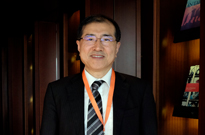
编者按:在刚刚结束的第十一届国际肝癌协会(ILCA)年会上,日本东京大学医院肝移植专家Norihiro Kokudo教授受邀做了关于日本肝癌肝移植现状与经验的专题报告。本刊特邀Singal教授进行了专访。
《国际肝病》: 请为我们介绍一下日本的肝移植现状?
Kokudo教授:在日本,肝脏器官捐献中的尸体供肝来源较少,每年仅70例左右。因此等待移植的患者通常需要等待2年左右,这么漫长的时间对于肝癌患者而言无疑是个不好的消息。因此,我们目前绝大多数肝癌肝移植都是活体肝移植,每年将近有400台肝移植手术,其中肝癌患者约占四分之一。
《国际肝病》:您的团队在肝移植手术的优化方面有哪些主要研究成果?
Kokudo教授:在肝移植术的优化方面,我们所能做的就是患者的筛选。日本目前遵循的是“5-5”筛选标准,即肿瘤大小5 cm以上,结节数目超过5个的患者,同时要求患者的肿瘤标志物--AFP和PIKVA-II水平相对较低。目前,日本正在酝酿出台一部全国性的肝移植筛选标准,将在“5-5”筛选标准的基础上加上AFP。
《国际肝病》:对于丙肝相关HCC的治疗,你们有什么经验?
Kokudo教授:我本人并非肝脏病学专家,对于肝炎的治疗我了解并不多。我们的数据显示,丙型肝炎患者的病毒载量得到有效控制后(水平较低或为0),其预后非常好。对于单发的大于5 cm、丙型肝炎相关的大肝癌患者,目前的5年生存率已超过了70%。相对而言,有关乙型肝炎的数据我们较少,但是目前的共识是对于病毒性肝炎尽早用药物控制对于延缓或阻断向肝癌进展有着积极的作用。
《国际肝病》:目前肝癌术后辅助放疗在延缓复发及改善预后方面的作用尚未达成共识,对此您有什么看法?
Kokudo教授: 在日本,由于严格的规程,放射性栓塞治疗尚不能用于临床。对于肿瘤外科医生而言,预防或延缓肿瘤复发方面所能做的只能是再次行肝切除术。我们已发表了一篇关于3次、4次行肝切除术的预后研究,结果比较令人满意。此外,基于一项随机对照研究显示,应用索拉非尼治疗较放射性栓塞并没有显著改善预后。未来,我们希望进一步研究一些亚组人群,寻找可以改善患者预后的策略。
原文链接:
Dr Kokudo: In my country, deceased liver donors are very few - around 70 cases per year. Waiting time is around two years, so this is not feasible for patients with liver cancer to wait that time. So most of the liver transplantation for liver cancer is done with living donor liver transplantation. We do 400 cases per year and out of those, 100 cases have liver cancer.
Dr Kokudo: All we can do is patient selection. We have selection criteria called the 5-5 Rule - up to five centimeters, five nodules - and tumor markers such as alpha-fetoprotein and PIKVA-II should be lower. Also in Japan, we are preparing a publication outlining our national criteria, which will include the 5-5 rule plus alpha-fetoprotein.
Dr Kokudo: I am not a hepatologist, so I don’t treat hepatitis. But according to our data, for hepatitis C patients, if the viral load is controlled (zero or lower), the patient outcomes are very good. For patients with single, up to 5cm nodules, the five-year survival rate is over 70%. In the case of hepatitis B, we don’t have much data, but I think it is the general understanding that viral hepatitis should be controlled using the very recently available drugs.
Dr Kokudo: I have to say that radioembolization is not available in Japan because of very strict regulations. The mainstay for tumor recurrence for surgeons is repeated liver resection and we have published a paper showing that even after the third or fourth liver resection, the outcomes are still acceptable. According to the outcomes of a recent randomized trial comparing sorafenib to radioembolization, I was very disappointed that there is no advantage. I hope there will be some subpopulation of patients who would benefit from this treatment.